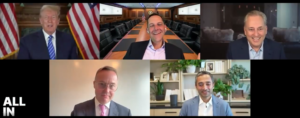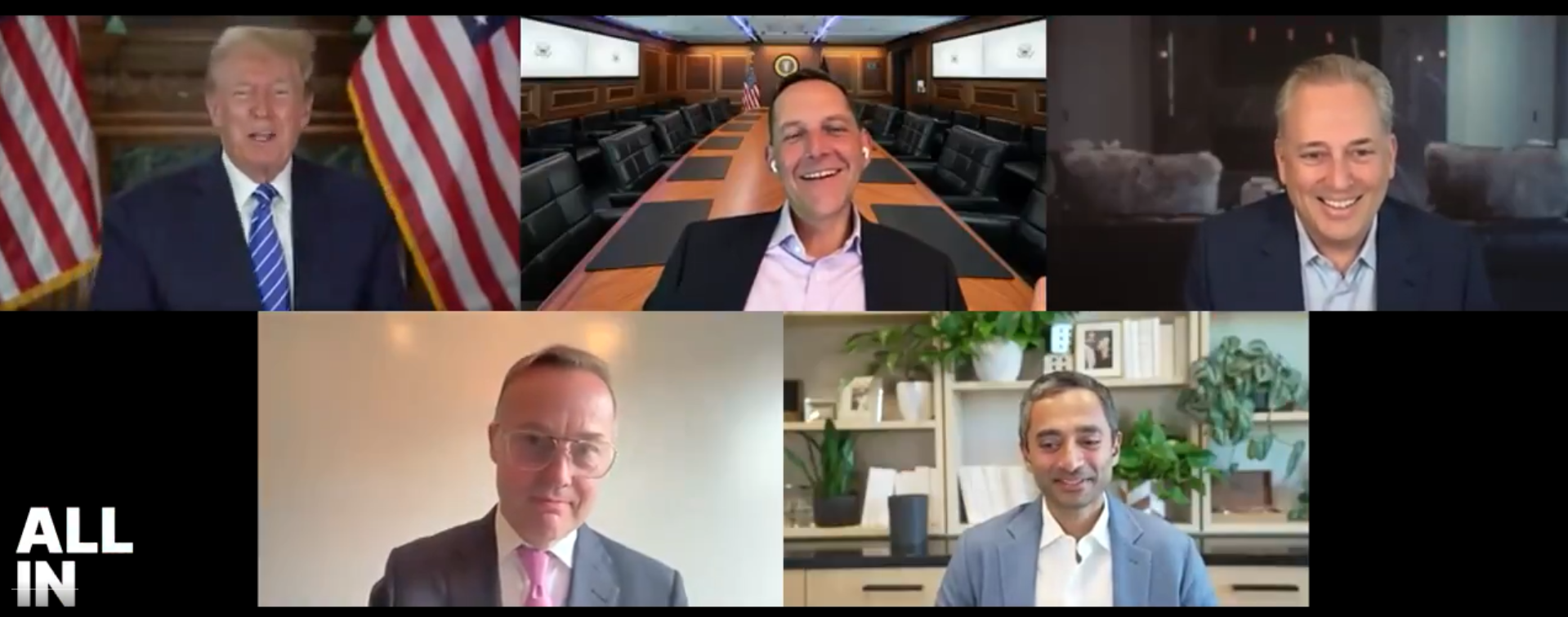
If you can’t imagine voting for Donald Trump, be careful, because more Americans than you would like might vote for Trump. The two leading contestants’ first debate is scheduled for June 27, 2024. However, one can taste what is coming from Donald Trump’s June 20, 2024, interview at All-In Podcast. The interview lasts only 48 minutes, but the following half an hour is also worth watching.
The four interviewers are not regular folks. All are venture capitalists from Silicon Valley. Jason Calacanis, the host, is the poorest of the four, with his wealth assumed to be only around $100 million. David Friedberg is likely a few hundred million richer, Chamath Palihapitiya is above one billion, and David Sachs might be already above two billion.
It could be no coincidence that the interview happened two weeks after David Sacks hosted a fundraising reception for Trump, which brought in $12 million. As expected, the businessmen started the interview by asking how Trump would stimulate business. The answer pleased their ears; it would be by cutting taxes and eliminating regulations.
But the surprise was somewhere else.
Trump acted presidential
During the entire interview, we heard Trump being politically correct; he did not offend anyone. There was regular bragging, but most politicians do it too. It was not the same man known for ridiculous tweets or claims about grabbing women’s private parts. He did not say a word about revenge. In the conversation after the interview, David Friedberg said that he took Trump’s good behavior with a pinch of salt, still remembering the old stuff. However, none of the four asked Trump about it.
Will tariffs on China innovate the American economy?
Trump repeated his support for a protectionist policy. As it seems the Democrats agree with it, none of the four businessmen noted that a strong economy does not need government protection.
In the following conversation, Friedberg cited the example of the recently destroyed Francis Scott Key Bridge in Baltimore. The original cost of building it in the 1970s was, in today’s dollars, $743 million (according to The New York Times; The Washington Post claimed it was only $316 million). Rebuilding the damaged section of it is estimated at $1.9 billion.
Something bad has happened in America over the last few decades; our productivity is a fraction of what it was two generations ago. It affects our ability to be competitive in the global market. Friedberg pointed out after the interview that China built one mile of high-speed railway for $18 million, while the same mile in the U.S. cost almost $1 billion. Unfortunately, he did not ask Trump how tariffs on trade with China would help Americans with this predicament.
The war in Ukraine is not about NATO
David Sacks did not ask a question about the war in Ukraine; he prompted Trump to repeat the narrative that the West provoked Russia by offering NATO membership to Ukraine. It was no surprise — Sacks makes pro-Russian posts almost daily at X. We do not know the dynamics inside the All-In team, but remarkably, none of the other interlocutors supported or opposed that view.
After the disbanding of the Soviet Union, NATO’s existence was in question. However, the nations freshly freed from Soviet domination had no illusions that Russian imperial aspirations had died as well.
In the 1990s, the former Soviet Bloc nations would likely have formed an alternative military alliance if NATO had firmly rejected their admission. That military alliance would likely have included Ukraine. NATO would have lost its purpose and might have dissolved. The new pact would have then become a guarantor of peace in Europe. Eventually, Western European nations and the United States would have joined it. We would have ended up with NATO, version 2. That is the bold truth that Trump and Sacks ignore.
Russian nationalists never gave up their desire to rule in Ukraine, so for them, the gradual NATO expansion gave them time to influence the internal politics in Ukraine. No one in Europe wants to interfere with Russia’s internal affairs. No one talked seriously about Ukraine being admitted to NATO until it became apparent that without Article 5, Russia would not stop threatening the independence of Ukraine.
The All-In panelists should know that and should have asked Trump to address that position.
The ocean was not wide enough twice already
Then, they asked Trump if he could envision the possibility of American troops getting directly involved in that war. Trump wished the French good luck with going after Russia, referencing the French president, Emmanuel Macron, who had that option open. According to Trump, America should not worry “because we have a big ocean in between.”
None of the four successful businessmen was a good enough interviewer to remind Trump that American politicians brought the same argument during World War I and World War II. In both cases, they were wrong.
Trump does not understand the causes and the forces behind the war in Ukraine. Hence, if elected, he might make decisions emboldening Russia to the point that a full-blown WWIII could not be avoided.
Sadly, David Sacks is similarly misinformed, and his partners at All-In, if they have any doubts, did not speak out when it was time to do that.
Trump has no concept for peace in the Middle East
When asked about that, he blamed the current administration, which did not explore an opportunity to bring Iran to better terms with the West. The argument is at least dubious.
To resolve this reigniting conflict, like with any other problem, we need to name it correctly first. The real problem is a few million Palestinians who are undesirable refugees in the land of their ancestors. Nothing will change unless this problem is addressed head-on. Trump does not see it this way and has no better idea. Four sharp investors seem to be unable to pinpoint the real problem either.
I outlined a possible solution in the article “Can Jews and Palestinians stop killing each other?” Show me a better idea if you know one.
Would we have peace if Trump won in 2020
Trump repeated that he would prevent war in Ukraine and the Middle East. In the conversation after the interview, the panelists agreed that Trump was not very convincing about these claims. I would add that the questioners were not knowledgeable enough to ask the right questions.
Trump will win on the abortion issue
The All-In panelists got from Trump the promise that he would not pursue a nationwide abortion ban. He is washing his hands of it and handing that to the states. One might be sorry for women in some states, but constitutionally, it is the right way to deal with that controversial issue.
Immigration, Trump’s Achilles’ heel
In 2016, Trump won, in big part because he promised a merciless anti-immigration policy. In 2020, he lost because enough Americans were against that ruthless policy. That should be an opening statement to converse with Trump about immigration. Again, the Trump-devoted supporter, Sacks, started with a statement supporting the border wall.
Sacks needs to learn why the border wall will never work, but his partners should know better. We do not know if they do; they stayed mum. American immigration policy is a purely socialistic concept that the government should manage the labor market. Socialism has not been working anywhere it has been tried, and it does not work in our immigration policy. Sharp businessmen should know that. The four from the All-In podcast, patting themselves on the back, do not get it yet.
America had a working immigration policy before the government started “improving” it in 1917. Thanks to that immigration, America became great the first time around. What was wrong with that? The four supposedly smart people from Silicon Valley did not ask that question.
When Trump talked about cutting regulations and government spending, the right question would have been about revoking our Prohibition-era immigration policy and dismissing the immigration enforcement apparatus, costing us now as much as the FBI and CIA combined. The capitalists from All-In did not know about that wasteland.
The question about college graduates that they missed
As venture capitalists, the All-In panelists want the freedom to hire the smartest people worldwide. So, Calacanis pushed Trump on H-1B visas. Trump answered that every foreign college graduate should have a green card offer attached to their diploma. Does it apply to young Americans who were brought here without a border inspection (a legal term for illegal entry) as children? That question did not cross the minds of All-In smarts.
Behind it is the fate of many so-called Dreamers, who, for about 20 years, cannot get a green card because their parents brought them here illegally, even though they proved to be valuable members of American society.
Immigrants no one talks about
Besides highly skilled immigrants, our economy needs an influx of low-skilled laborers. It is one of the simplest ways to keep American jobs from going abroad. Trump and the anti-immigration crowd do not see that. In the conversation after the interview, Friedberg mentioned that he heard that the present policy of letting foreigners in is to satisfy that need for low-skilled labor. No one picked up on that. No one noticed that a reasonable immigration policy could do it much better.
Sadly, that critical aspect of keeping American jobs from going abroad, which is an important part of Trump’s agenda, did not come up during the interview.
They missed the elephant in the room
A rational immigration policy can be a dream for investors and a boon for the nation. The All-In panelists did not present it that way to Trump.
A dysfunctional health care system is another obstacle to prosperity for most Americans. I guess it is not a problem for the panelists at All-In, so the subject did not come up in the conversation with Trump.
Trump promised a “terrific” health care plan during his first presidency but delivered nothing. There was no question about it in the interview.
What did Trump say about the upcoming debate with Biden?
He avoided saying anything negative about Biden. Remarkably, he repeated more than once that in 2012, Biden beat Paul Ryan in the debate. Believe it, Trump will be well-prepared.
Who will benefit if Trump wins?
The populist narrative is all over Trump’s agenda. However, when one looks at cases like lowering taxes, eliminating regulations, or reforming immigration and health care, there is nothing in the Trump agenda that will increase the ability of the middle class to prosper. However, it would benefit people like the All-In panelists.

 Many tell us what to think. I ask my readers to be skeptical. Question me and others.
Many tell us what to think. I ask my readers to be skeptical. Question me and others. 
